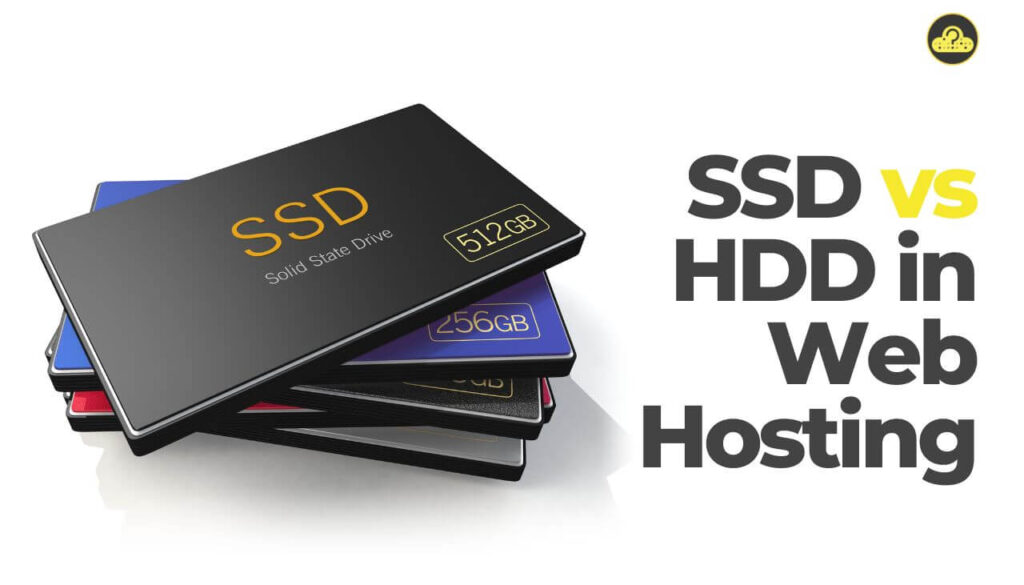On This Page: [hide]
SSD and HDD are two of the most common types of drives used in web hosting. SSDs, or Solid-State Drives, are much faster and more reliable than HDDs, or Hard Disk Drives, guaranteeing higher uptime for your website. SSDs have no moving parts, so they can access data faster and are less prone to failure. However, they are also more expensive.
HDDs have spinning disks and a mechanical arm, which makes them cheaper, but they are slower and more prone to failure. Ultimately, the battle “SSD vs HDD” in web hosting comes down to the user’s budget and performance requirements.

SSD vs HDD: Why Does the Comparison Matter?
Comparing SSD and HDD in web hosting matters because the type of storage you choose can have a huge impact on the performance and reliability of your website. SSDs are much faster than HDDs, so if your website requires fast loading times, an SSD would be the better option. SSDs also have no moving parts, making them more reliable and less prone to data loss.
SSDs have a much lower risk of failure and data corruption compared to HDDs. Ultimately, choosing the right type of storage for your hosting needs is key to having a successful website.
Does HDD or SSD Hosting Server Last Longer?
HDD and SSD hosting servers both last for a long time, but SSD hosting servers last longer. This is because SSDs have no moving parts and are more resistant to shock and vibration than HDDs.
SSDs have a longer life span, which means you can expect your server to last longer when using an SSD. Ultimately, both types of servers can last a long time, but SSD hosting servers last longer.
Is SSD More Reliable Than HDD in Hosting?
SSD’s are becoming more and more popular for hosting, as they offer more reliable performance and faster speeds than traditional HDDs. SSDs are less prone to data corruption, provide better energy efficiency, and are less susceptible to physical damage. Additionally, SSDs have a longer lifespan and are less prone to fragmentation than HDDs, making them more reliable for hosting.
When to Use HDD in Web Hosting?
Hard disk drives (HDDs) are a common form of storage used in web hosting. HDDs are reliable and can store large amounts of data (database servers), making them ideal for users who need to store a lot of data on their websites. They also have low access times, meaning they can quickly access stored data.
HDDs are best used for websites with large amounts of static content, such as images, videos, and documents. They are also great for hosting large databases and applications that require quick access to large amounts of data.
When to Use SSD in Web Hosting?
SSD can be used in web hosting to improve website performance and speed. Since SSDs are faster than traditional hard drives, they can significantly reduce page loading times and improve website responsiveness.
Тhey consume less power, generate less heat, and are more reliable than traditional hard drives, making them ideal for web hosting. SSDs are also more secure since they don’t have any moving parts, which makes them less likely to suffer data loss due to mechanical failure.
Is It Worth Moving from HDD to SSD Hosting Server?
Moving from HDD to SSD hosting server is definitely worth it. SSD hosting servers offer faster read and write speeds, resulting in faster loading times for websites.
SSD hosting servers also have more reliable performance and are less prone to failures and crashes due to their lack of moving parts. Overall, SSD hosting servers are a great upgrade that offer better performance, take less from the device’s RAM, offer better reliability, and faster loading times.
Why Do Servers Still Use HDD?
Hard disk drives (HDDs) are still a popular choice for servers because of their cost efficiency and durability. They are much cheaper than Solid State Drives (SSDs) and can store a large amount of data in a small space.
HDDs are also reliable and even not as reliable as SSDs, they can withstand more shock and vibration, making them ideal for servers that are constantly used and moved around. Furthermore, HDDs are better at handling large workloads than SSDs, which can improve the performance and reliability of a server.
How Long Does HDD Last In a Hosting Server?
HDD (Hard Disk Drives) have been used in hosting servers for many years, with their reliability and affordability making them a popular option. Generally speaking, HDD can last anywhere from three to five years in a hosting server environment.
However, this time frame can vary greatly depending on the environment, usage, and maintenance of the server. Proper maintenance and monitoring can help extend the life of a server’s HDD, while poor maintenance and high usage can lead to a shorter lifespan.
SSD vs HDD: Conclusion
The debate between SSD and HDD in web hosting hinges on understanding their key differences and implications for performance, reliability, and cost-effectiveness. While HDDs offer larger storage capacities at lower costs, SSDs excel in speed, efficiency, and durability.
Ultimately, the choice between SSD and HDD depends on the specific needs and priorities of the website owner, balancing factors such as speed requirements, budget constraints, and data storage needs.
